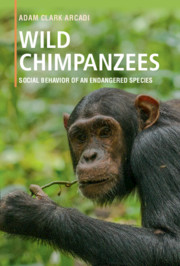Book contents
- Wild Chimpanzees
- Wild Chimpanzees
- Copyright page
- Dedication
- Contents
- Preface
- 1 Primates, Apes, and the Study of Chimpanzee Social Behavior
- 2 Seven Long-Term Field Studies
- 3 Chimpanzee Fission–Fusion Social Organization and Its Conservation Implications
- 4 Sex Differences in Ranging and Association Patterns
- 5 Female Social Relationships
- 6 Male Social Relationships
- 7 Sexual Behavior: Conflicting Strategies of Males and Females
- 8 Coalitionary Lethal Aggression between and within Communities
- 9 Hunting, Eating, and Sharing Meat
- 10 Communication: The Form and Content of Signals
- 11 Community Differences in Grooming Postures and Tool Use: Innovation, Social Learning, and the Question of “Culture”
- Epilogue
- Appendix: Field Methods for Studying Wild Chimpanzees
- End Notes
- References
- Index
- Plate Section (PDF Only)
11 - Community Differences in Grooming Postures and Tool Use: Innovation, Social Learning, and the Question of “Culture”
Published online by Cambridge University Press: 01 June 2018
- Wild Chimpanzees
- Wild Chimpanzees
- Copyright page
- Dedication
- Contents
- Preface
- 1 Primates, Apes, and the Study of Chimpanzee Social Behavior
- 2 Seven Long-Term Field Studies
- 3 Chimpanzee Fission–Fusion Social Organization and Its Conservation Implications
- 4 Sex Differences in Ranging and Association Patterns
- 5 Female Social Relationships
- 6 Male Social Relationships
- 7 Sexual Behavior: Conflicting Strategies of Males and Females
- 8 Coalitionary Lethal Aggression between and within Communities
- 9 Hunting, Eating, and Sharing Meat
- 10 Communication: The Form and Content of Signals
- 11 Community Differences in Grooming Postures and Tool Use: Innovation, Social Learning, and the Question of “Culture”
- Epilogue
- Appendix: Field Methods for Studying Wild Chimpanzees
- End Notes
- References
- Index
- Plate Section (PDF Only)
Summary
OVERVIEW
The social systems of wild chimpanzee communities appear fundamentally similar across the species range, with the exception of the very small Bossou group, which is hemmed in by human settlement and isolated from other chimpanzee populations. Nevertheless, there is a remarkable degree of variation between communities in the expression of numerous social and nonsocial behaviors. In some cases, the same general behavior may be performed in different ways in different communities. For example, distinctive postures adopted during bouts of social grooming are common in some populations but not others. Alternatively, a specific behavior, such as using stones to crack open nuts, may be exhibited in one population but not another, even though stones and nuts are available to both. Scrutiny of longterm records has revealed scores of behaviors that vary between field sites and many community-specific patterns that persist over time.
The existence of persistent, community-level differences in behavior raises a host of questions about chimpanzee cognition. Answers to these questions will greatly improve our understanding of chimpanzee behavioral flexibility and will contribute to hypotheses about the evolution of cultural behavior in human ancestors. For example, to what extent are behavioral variants socially learned? If social learning is implicated, what types of learning are involved? Do chimpanzees teach each other skills? What conditions favor innovation? Are some individuals more likely to be innovators than others? Do behavioral innovations build on each other? How important is inter-individual tolerance for the transmission of behavioral variants? Do behavioral patterns diffuse across populations? Are chimpanzees inclined to conform to group patterns? And finally, do chimpanzees experience a sense of group identity as a consequence of shared patterns of behavior?
Such questions about chimpanzee cognition, however, are difficult to investigate under field conditions. There are several reasons for this. First, it is difficult to disentangle the various influences between infancy to adulthood that may contribute to the development of a specific behavior in an individual. Second, the spread of a novel behavior, introduced through either spontaneous innovation or immigration, is a comparatively rare occurrence. Finally, if a researcher is lucky enough to observe a newly introduced behavior, analyzing its potential diffusion then requires comprehensive and long-term study that is not easily accomplished under field conditions.
- Type
- Chapter
- Information
- Wild ChimpanzeesSocial Behavior of an Endangered Species, pp. 135 - 144Publisher: Cambridge University PressPrint publication year: 2018



